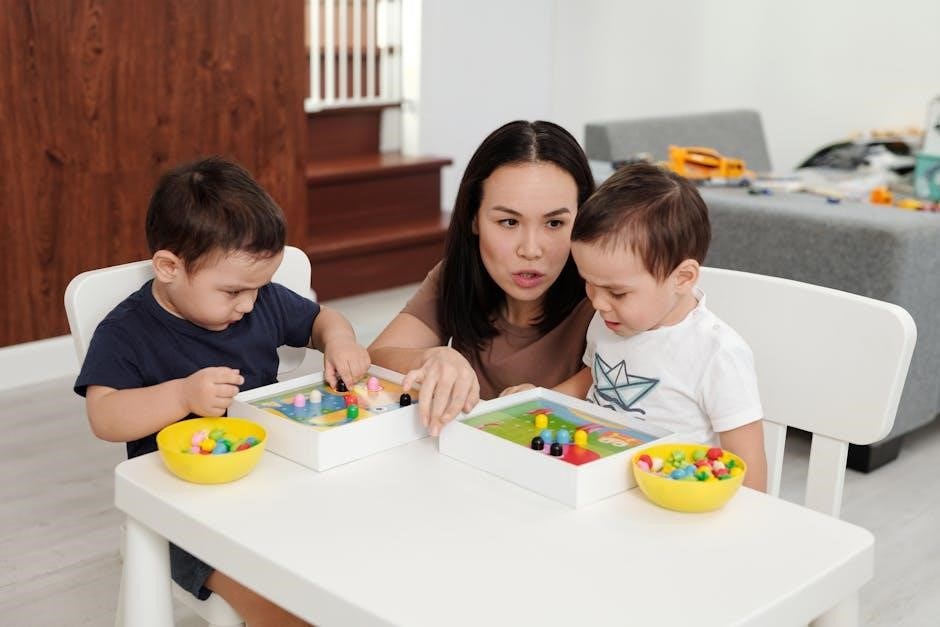Welcome to the Scoop Parents Guide, your comprehensive resource for navigating modern parenting challenges. This guide provides valuable insights and practical advice to help you support your child’s growth, fostering healthy development and addressing key issues like mental health, screen time, and communication. Empowering you with knowledge to create a nurturing environment for your family.
1.1 Understanding the Purpose of the Guide
Welcome to the Scoop Parents Guide, a comprehensive resource designed to support parents in navigating the complexities of modern parenting. Our mission is to provide evidence-based strategies and practical advice to help you address challenges such as communication, mental health, and screen time management. Tailored for parents seeking to foster holistic development in their children, this guide offers insights and tools to create a nurturing and supportive home environment.
1.2 Key Areas Covered in the Guide
This guide explores essential topics to help parents navigate modern challenges. Key areas include fostering effective communication, managing screen time, addressing mental health, and providing educational resources. It also covers social media safety, discipline strategies, and practical daily parenting tips. Each section is designed to empower parents with tools and insights to support their child’s development and create a balanced, nurturing home environment.

Importance of Communication in Parenting

Effective communication is the cornerstone of healthy parenting, fostering trust, understanding, and emotional connection. Open dialogue helps children feel secure, encouraging transparency and active listening, which are vital for their mental and emotional growth.
2.1 Active Listening and Open Conversations
Active listening involves fully engaging with your child, understanding their thoughts, and validating their feelings. Encourage open conversations by creating a safe, non-judgmental space where they feel heard. This fosters trust, emotional intelligence, and healthy communication habits. By maintaining eye contact, nodding, and asking open-ended questions, you show genuine interest, helping your child express themselves confidently and openly. This approach strengthens your bond and supports their mental and emotional growth.
2.2 Encouraging Transparency with Your Child

Encouraging transparency with your child builds trust and honesty in your relationship. Lead by example, sharing your thoughts and feelings openly while respecting boundaries. Create opportunities for open dialogue, where your child feels safe to express themselves without fear of judgment. Celebrate honesty and address mistakes compassionately, fostering an environment where transparency becomes a natural part of communication. This helps your child develop emotional resilience and strong moral values.

Monitoring and Managing Screen Time
Effective screen time management involves setting healthy limits, balancing digital activities with physical ones, and using educational resources to promote learning while ensuring safety and well-being.

3.1 Setting Healthy Limits on Digital Devices
Setting healthy limits on digital devices is crucial for balancing screen time with physical and creative activities. Establish clear rules, such as screen-free zones and time restrictions, to promote mental and physical well-being. Encourage outdoor play, reading, and family interactions to foster holistic development. Consistently enforce these boundaries while explaining their importance to help your child understand the value of moderation in a digital world.
3.2 Educational Apps and Resources for Kids
Educational apps and resources can enrich your child’s learning experience, fostering creativity and skill development. Interactive platforms like Khan Academy and Duolingo offer age-appropriate content, while tools like K5 exemplars provide structured learning materials. Utilize these resources to supplement your child’s education, encouraging a love for learning through engaging and fun activities that align with their interests and developmental needs.

Addressing Mental Health in Children
Recognizing signs of depression or anxiety in children is crucial. Creating a supportive home environment and seeking professional help when needed can make a significant difference.
4.1 Recognizing Signs of Depression or Anxiety
Children may exhibit withdrawal, irritability, or changes in sleep patterns, indicating potential mental health struggles. Social media exposure can amplify these risks, as highlighted by recent studies. Recognizing these signs early allows parents to provide timely support and seek professional intervention, fostering a healthier emotional environment for their child’s well-being and development.
4.2 Building a Supportive Environment at Home
Creating a nurturing home environment involves fostering open communication and emotional safety. Encourage honesty by actively listening to your child and validating their feelings. Promote mindfulness and stress management techniques, such as deep breathing or journaling, to help them cope. A stable routine, positive reinforcement, and unconditional support can strengthen their resilience and overall well-being, addressing mental health challenges effectively.
Educational Resources for Parents
Discover a variety of educational tools, including guides for early learning frameworks, academic development resources, and apps that support your child’s growth and development effectively.
5.1 Guides for Early Years Learning Framework
The Early Years Learning Framework provides parents and educators with structured guides to support children’s development. These resources include practical strategies, activity ideas, and tools to foster cognitive, social, and emotional growth. Designed for early childhood education, they emphasize play-based learning and holistic development, ensuring children build a strong foundation for future academic success. Aligning with educational standards, these guides help create engaging and nurturing environments for young learners.
5.2 Tools for Academic and Personal Development
Discover a variety of tools designed to enhance your child’s academic and personal growth. From educational apps to interactive learning platforms, these resources provide engaging ways to develop skills such as problem-solving, critical thinking, and creativity. Additionally, find guides focused on social-emotional learning, helping children build confidence, self-awareness, and healthy relationships. These tools empower parents and educators to support holistic development, ensuring children thrive academically and personally.
Navigating Social Media Challenges
Understand the impact of social media on children’s mental health and guide them toward responsible online behavior to ensure their safety and well-being in the digital world.
6.1 Understanding Potential Mental Health Risks
Social media use among children is linked to rising mental health concerns, including anxiety, depression, and low self-esteem. Cyberbullying, unrealistic comparisons, and sleep deprivation are significant risks. Parents must recognize these signs to provide timely support and foster a healthy online environment for their children to thrive emotionally and socially in the digital age.
6.2 Teaching Safe and Responsible Online Behavior
Teaching safe online behavior involves setting clear boundaries, monitoring usage, and educating your child about digital risks. Encourage open conversations about cyberbullying, privacy, and inappropriate content. Use parental controls and educational apps to guide them. Foster a balance between online freedom and responsibility, helping your child develop smart habits for lifelong digital citizenship and safety in the virtual world.
Discipline and Boundary Setting
Effective discipline involves consistent, positive strategies to guide behavior. Set clear expectations and balance freedom with responsibility, fostering accountability while encouraging independence and self-discipline in your child.

7.1 Effective Strategies for Positive Discipline
Positive discipline focuses on teaching, not punishing. Set clear expectations and use natural consequences to guide behavior. Encourage open communication and problem-solving together. Stay calm, consistent, and patient, ensuring fairness and empathy. Avoid harsh punishments, instead fostering responsibility and self-regulation. By modeling good behavior and offering choices, you help your child develop self-discipline and a strong moral compass, building their confidence and independence over time.
7.2 Balancing Freedom and Responsibility
Striking a balance between freedom and responsibility helps children grow into capable individuals. Gradually grant independence, allowing them to make choices while setting clear boundaries. Encourage accountability by linking privileges to responsibilities, like chores or homework. Praise efforts and guide through mistakes, fostering self-reliance. This approach nurtures confidence and teaches life-long decision-making skills, preparing them for independence while ensuring they understand the importance of their actions.

Practical Tips for Daily Parenting
Establish routines, use positive reinforcement, and encourage open communication. Create a family calendar, set clear expectations, and offer consistent support. Foster independence while providing guidance to help your child thrive.
8.1 Managing Chores and Daily Routines
Establishing a structured schedule helps children develop responsibility and time management skills. Assign age-appropriate chores, use visual reminders, and maintain consistency. Encourage accountability by linking tasks to privileges. Model good habits and provide positive reinforcement. A well-organized routine fosters independence and reduces household chaos, creating a balanced and productive family environment. This approach helps children understand the value of contributing to the household while building life skills.
8.2 Encouraging Independence and Self-Reliance
Encourage independence by allowing children to make age-appropriate decisions and solve problems. Praise their efforts, even when outcomes aren’t perfect. Teach practical life skills, such as time management and self-care, to build confidence. Gradually increase responsibilities, fostering a sense of ownership and self-reliance. Support their exploration of interests and passions, helping them develop resilience and a growth mindset. This empowers them to navigate challenges independently and thrive.
9.1 Summarizing Key Takeaways
The Scoop Parents Guide emphasizes effective communication, boundary-setting, and fostering independence. It highlights the importance of balancing screen time with educational resources and monitoring online activities. Prioritizing mental health, encouraging open conversations, and creating a supportive home environment are key. Practical tips for daily routines and promoting self-reliance equip parents with tools for nurturing well-rounded children. Continuous learning and adaptability are essential for meeting modern parenting challenges effectively.
9.2 Continuous Learning for Effective Parenting
Effective parenting requires ongoing education and adaptability. The Scoop Parents Guide encourages staying informed through resources like educational apps, mental health guides, and tools for academic support. Parents should regularly update their strategies by engaging with workshops, online courses, and community forums. Continuous learning ensures parents are equipped to address evolving challenges and provide the best possible support for their children’s growth and well-being in a dynamic world.

Be First to Comment